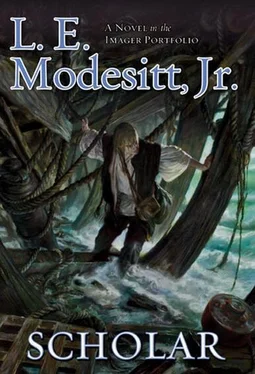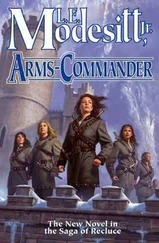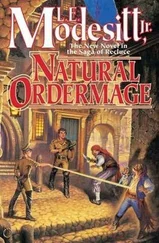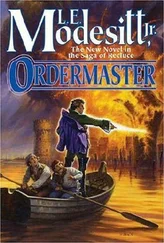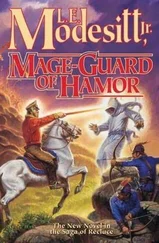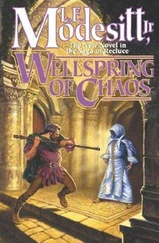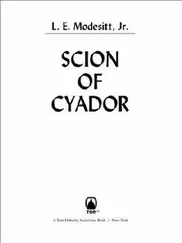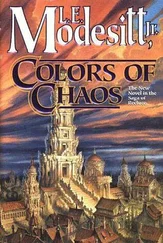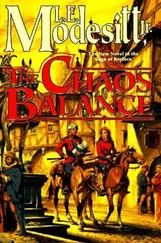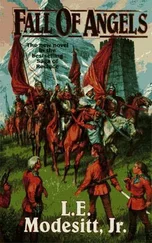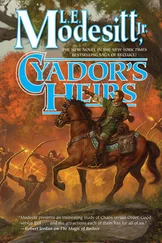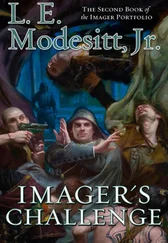L. Modesitt - Scholar
Здесь есть возможность читать онлайн «L. Modesitt - Scholar» весь текст электронной книги совершенно бесплатно (целиком полную версию без сокращений). В некоторых случаях можно слушать аудио, скачать через торрент в формате fb2 и присутствует краткое содержание. Жанр: Фэнтези, на английском языке. Описание произведения, (предисловие) а так же отзывы посетителей доступны на портале библиотеки ЛибКат.
- Название:Scholar
- Автор:
- Жанр:
- Год:неизвестен
- ISBN:нет данных
- Рейтинг книги:3 / 5. Голосов: 1
-
Избранное:Добавить в избранное
- Отзывы:
-
Ваша оценка:
- 60
- 1
- 2
- 3
- 4
- 5
Scholar: краткое содержание, описание и аннотация
Предлагаем к чтению аннотацию, описание, краткое содержание или предисловие (зависит от того, что написал сам автор книги «Scholar»). Если вы не нашли необходимую информацию о книге — напишите в комментариях, мы постараемся отыскать её.
Scholar — читать онлайн бесплатно полную книгу (весь текст) целиком
Ниже представлен текст книги, разбитый по страницам. Система сохранения места последней прочитанной страницы, позволяет с удобством читать онлайн бесплатно книгу «Scholar», без необходимости каждый раз заново искать на чём Вы остановились. Поставьте закладку, и сможете в любой момент перейти на страницу, на которой закончили чтение.
Интервал:
Закладка:
“Out here, even Phargos does it in Tellan. We don’t have two services here. But you speak well in either tongue, I think.”
“I think you’ve twisted my very sore arm far enough, Major,” answered Quaeryt dryly. “I’ll do it.” He paused. “You mean tonight? Where are the services?”
“I mean tonight. I wouldn’t have asked if you looked like you were dragging. We hold services in the main dining hall-just out there.” He pointed through the door to where the troopers were gathered for their meal.
“I should have looked worse,” quipped Quaeryt.
“It’s too late for that now, scholar,” returned Skarpa. “Enjoy your food.”
“Because I won’t enjoy acting as chorister?” Quaeryt shook his head. “I’m going to have to be more careful around you.”
“The captains and undercaptains learn that quickly,” said Meinyt.
Skarpa just laughed.
The mess began to fill, and before long, lager, ale, and platters were before those at the table. The sliced mutton, mashed potatoes, and some kind of gourd, all covered with a brown gravy, were decent, but unsurprisingly, not nearly so good as the food at the Telaryn Palace.
Finally, as the officers’ mess emptied, Quaeryt stood and adjusted the sling. It had been a long day, and his shoulder was throbbing.
“You sure you’ll be all right, scholar?” asked Skarpa.
“I’m a little tired, but I’ll be fine. I don’t talk with my shoulder.” He offered a quick grin.
Less than a quint later, Quaeryt followed Gauswn into the end of the dining hall, where they faced perhaps a hundred rankers and a handful of officers. Quaeryt saw Meinyt and Skarpa in the rear to one side.
After a long pause, the undercaptain stepped forward. He wore a plain white scarf over his undress greens, not nearly so long as those worn by true choristers, but his voice was firm as he began with the traditional greeting. “We gather together in the spirit of the Nameless and to affirm the quest for goodness and mercy in all that we do.”
The opening hymn followed, and it was “Praise Not the Nameless,” but sung in Tellan. That wasn’t surprising, either, since it was one of the better-known hymns. Then came the confession, ending with, “… and deference to You who cannot be named or known, only respected and worshipped.”
Quaeryt murmured “In peace and harmony” with the others, but standing where he was, he didn’t have to offer coins for the offertory basket, for which he was grateful.
Since there was no pulpit, after the offering was collected he just stepped forward. “Good evening,” he offered in Tellan.
“Good evening,” came the murmured reply.
“Under the Nameless all evenings are reckoned as good … but how good … well … it’s not raining, and for that we can all thank the Nameless.”
A low chuckle ran through those assembled.
“A few of you just may have heard about Rholan the Unnamer.” Quaeryt paused, hoping his understatement would at least draw smiles and a few chuckles.
It did, and he went on. “Just before I was posted to Tilbor, I happened to read about Rholan in an ancient tome that might not have been opened since it was written over a century ago. Reading old, old books often doesn’t tell you as much as you hope, but this one, and some of the others, got me to thinking. Rholan is the most famous exponent of the Nameless, yet we know almost nothing about him as a man, as if he tried, in fact, to be as nameless as possible. He was born in Montagne, we think, but do not know for sure, and lived there most of his life. He never traveled more than a two hundred milles from there, and he disappeared after traveling to Cloisonyt in his fifty-third year. Yet his words and acts changed all Lydar.
“You have certainly heard his most famous precepts, such as ‘A name does not equal deeds’ or ‘When the body is a slave to the name, both are servants of the Namer.’ You know that every anomen is without adornment within and without because Rholan declared that adornment that serves no function and provides no use is a form of Naming. He made the point that acts always triumph over names, and in a sense his own life proves that. We know little of him, only what he said, only in the questions he raised.
“Yet there is an irony in that, because we tend to revere his name, often ignoring his precepts, and while I am no chorister, I have the feeling that Rholan would rather have been more forgotten than to have his words, and even his questions, ignored in favor of remembering his name. Yet … were another such as he to arise, who offered such precepts and questions, would we pay attention to them, or would we require proof of deeds?
“We talk of deeds and acts, but if either a deed or an act is used as a proof of something, is that not also Naming?
“You are all soldiers, and I am a scholar, and it is most unlikely that, even if we wished otherwise, which we should not, our names will outlive us, except in the hearts and thoughts of those closest to us. What will outlive us is our actions, for better or worse, those actions undertaken for the sake of the action itself, and not for fame or glory…”
Quaeryt went on to talk about the value of actions, citing a few great military acts along the way, then concluded, “… and yet the irony, which we should never forget, is that deeds can only be remembered through words, and words, used too freely, can easily become boasting, and thus a form of Naming. In that, I would observe that, indeed, the hardest part of accomplishing deeds, both great and small, is letting them speak for themselves and resisting the temptation to speak of them.”
After the benediction, Quaeryt waited as the worshippers, mainly rankers, filed out of the dining hall.
Then the undercaptain turned to Quaeryt. “You mentioned the coming of another such as Rholan. Do you think that possible?”
“Anything is possible, but I think it unlikely we will ever see another exactly like Rholan. We might see another who raises those questions in another fashion.”
“You could be a chorister, Scholar Quaeryt.”
“Not week after week, I fear, but thank you anyway.”
Skarpa stepped forward, smiling. “I’ll have to tell Phargos what you said. After all his homilies I never heard that about Rholan.”
Quaeryt laughed softly. “There are some things a scholar should know that not even choristers know.”
54
The first part of the week passed relatively uneventfully for Quaeryt. He kept practicing with his contrived system, varying the timing and adding weight to the rope, so that his shields seemed to react instantly to any intrusion. His strength had largely returned, and he had no more incidents of fever, although soreness persisted in his shoulder, and he had trouble sleeping for long periods because he still was limited to sleeping on his back or his right side.
He spent his time, when he wasn’t practicing his shields, studying the post, asking questions and listening at meals and in the evening in the officers’ mess and trying to learn more about Tilbor and the regiment. While he did find out more, nothing he heard added anything new, but rather filled out with specific details what he already knew.
Finally, at breakfast on Jeudi, he looked across the table at Skarpa. “Major … are there any patrols that just stay in the valley?”
“There’s one every day. It’s tedious. They patrol around the edges of the entire valley looking for tracks or signs that anyone may be scouting the post … or causing trouble. It’s part training and part precaution.”
“I’d like to accompany them today.”
Skarpa frowned. “Are you up to that?”
Quaeryt offered a grin. “I can ride. I never was any good with weapons, and I wouldn’t be any trouble. And if I get too tired, I can certainly find my way back. There haven’t been any brigands in the valley itself in years. That’s what Meinyt said.”
Читать дальшеИнтервал:
Закладка:
Похожие книги на «Scholar»
Представляем Вашему вниманию похожие книги на «Scholar» списком для выбора. Мы отобрали схожую по названию и смыслу литературу в надежде предоставить читателям больше вариантов отыскать новые, интересные, ещё непрочитанные произведения.
Обсуждение, отзывы о книге «Scholar» и просто собственные мнения читателей. Оставьте ваши комментарии, напишите, что Вы думаете о произведении, его смысле или главных героях. Укажите что конкретно понравилось, а что нет, и почему Вы так считаете.
